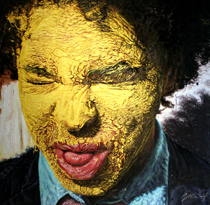Poetry, Film, History & Biography Reviews
George Elliott Clarke
England is Mine
by Todd Swift
Montreal, QC: DC Books, 2011
106 pp. $17
Kerosene
by Jamella Hagen
Gibsons, BC: Nightwood Editions, 2011
80 pp. $19
The standard, English-Canadian poem is competent and earnest (a most polite form of unrest), and one-part nature and one-part nostalgia. Flora and fauna are observed, and memories are preserved. No harm done. Luckily, there are Canuck poets who escape this limiting structure, and Todd Swift is one. Born in Montreal in 1966, he now makes his home and living (teaching) in London, England, and so is as steeped in contemporary British poetry as he is in that of our native land. This expansive knowledge makes a difference.
Swift’s seventh collection of poetry, England Is Mine, is a great achievement. It combines intellect and wit, pop culture and canonical riffs. It refuses to be average, and yet is accessible. Swift’s debts to Brits – Yeats, Auden, Larkin, and Eliot – are clear. Less obvious, perhaps, are his debts to the Brit Thom Gunn and, domestically, to Leonard Cohen, John Glassco, and Earle Birney. What he gathers from all these poets is a deft ability to be ironic and learned, but also down-to-earth and plain. England Is Mine is a trove of technique and accomplishment. One set of quatrains considers how repressed lust reminds one, in “Each enticing met face / … not of pleasure, / But of pleasure’s final consequence – / An exhaustion, fine and judicious // As strong boys wrestling….â€
“Villon’s Letter,†using loosened tercets, is erotic and erudite: “How else may a Frenchman praise / an angel who masquerades as Venus?†Can Swift do free verse? Yep: “Out of nothing / is August, then / unpublishing trees / (the fall’s poems) / forgotten underfoot.†The lyrics are well-executed, but also fun – plus, plus, plus: “I feel / I’d save her now, too, as // She is always on my tongue; / The beautiful Queen, / So good, so young.â€
Swift doesn’t only ransack bookstores. He views films and buys records. He can talk about “going gaga for Madonna, or seeing a Beatle in the pile.†There’s a poem dedicated to Goldfinger (the film); and an elegy for “Q†– Quartermaster – played by Desmond Llewelyn in 17 Bond flicks. An elegy for the library (an institution predicted to disappear) shows Swift’s Walcottian skill at extended metaphor: “Still, it isn’t so bad in this page-littered / Mausoleum, a permanent autumn of loose / Leaves and broken spines; it’s just a ward / Where all the injured veterans of old / Romantic war lie, under their sheets, to fold / Into the future like a memory of wind-turning // Narration: a novel ride, reading, at the sea….â€
These are smart, sassy poems – sure-footed in metre and incisive in song. See “122 Lines for Saraâ€: “Place my feelings for Sara, now, here // in this room – on the edge of where / you are, seeing yourself, words / diminishing, and the colours – / the small plenty – the smell, touch // of a world – who you are – permeates. / Place Sara here. Safely. Please know / her as I do. Love her as you love / whatever or whomever you love….†Indeed: There is naught not to love in Swift.
Jamella Hagen’s Kerosene is a fine debut. Yet, it suffers in comparison with Swift’s work. True: He is more skilful – and playful. But Hagen seems less accomplished because she is accomplishing less: that is to say, this volume satisfies the Anglo-Canadian average. These lyrics attain the same-old, age-old, old-hat renditions of memories – pages cut from a diary – or woodcuts of nature, views lifted from experience, yes, but still no fresher than the verse of Peggy Atwood, Pat Lowther, or even E. Pauline Johnson.
Hagen crafts good, solid, Creative Writing Workshop verse: “That first winter / your mother and I had goats – / we lived upstairs in the bedroom / the goats lived downstairs, / that’s why there are tooth marks / all over the living room walls.†There’s an Ondaatje-precision to the unusual images, and in the economy of words: “We butchered for a year.†Still, there’s no struggle in this language. One never wants to say, “Ah!†The travel lyrics also fail to be more than pleasant postcards: “Higher up in the hills when the windows / fog over, I use my hand to clear / a little view into the rain. Goats / tethered outside small wet houses / remind me of home.†I rewrite Sade: “Make more effort, Anglos, if you would be poets.â€






Hi Professor Clarke,
It’s been a long time since Modern Canadian Poetry! I wanted to ask you a question about your opening line- perhaps it’s more about defining mystical and intellectual from a poetic perspective-
How do you define the poetry of Rumi, Hafez and other sufi poets? They defy the ‘intellectual’ term– would you call them ‘mystical’ or ‘sentimental’- or are they accessible enough to not be defined as either ‘intellectual’ or ‘mystical’, despite being rooted in a mystical tradition?
Hope you’re doing really well!